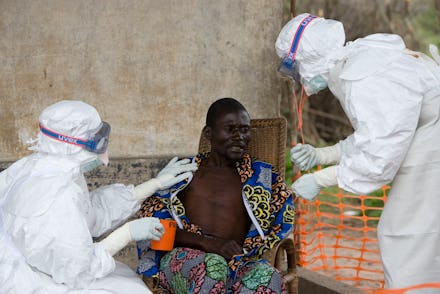A Massive Epidemic Is Taking a Serious Turn for the Worse in Africa

The news: The world's gaze may be on the conflict in Gaza or eastern Ukraine, but a historic epidemic is ravaging West Africa: The world's deadliest Ebola outbreak has spread to three countries, with the death toll growing.
Since the outbreak began in March, the World Health Organization (WHO) reported that over 630 people have died and around 1,000 cases have been reported. As if that's not enough, the doctor who has been leading the fight against it in Sierra Leone, Sheik Umar Khan, has also been infected.
Ebola kills nearly 90% of those infected, and there is no cure. The only recourse doctors and medical aid workers have is to raise awareness in the area and to continue the use of quarantine and protective gear to curb spreading. But with rampant misinformation and local culture clash with medical proceedings, the number of people infected will almost certainly continue to rise.
From bad to way worse: The numbers are startling: Guinea has had 410 cases and 310 deaths, Sierra Leone has had 442 cases and 206 deaths and Liberia has had 196 cases and 116 deaths.
The situation is exacerbated by myths about Ebola and resistance toward international aid workers. Many locals believe that foreigners brought the disease, while others say that drinking Nescafé mixed with two large onions, cocoa and sugar will remedy the infection.
Resources are wearing thin — dozens of nurses went on strike after three colleagues died from the disease, and Doctors Without Borders workers can't gain access to some affected regions because of hostility with local residents. Though the nurses have returned to work now, the epidemic is continuing to spiral out of control.
The outbreak breakdown: The origins of the virus have yet to be confirmed. However, authorities suspect that it may have initially started by people eating fruit bats, a local delicacy but also a natural host of Ebola.
Countries in the infected zone have stepped up travel restrictions and mandatory screenings before flights to help control the rapid spreading within Sierra Leone, Liberia, Guinea and beyond. But oftentimes, the infected can go days without exhibiting symptoms. Contamination may also be rising because the zones with outbreaks are rural and have low levels of sanitation.
The virus spreads through bodily fluids like blood, saliva and sweat. It causes a viral hemorrhagic fever, which affects multiple organ systems and is accompanied by external and internal bleeding.
What happens now? The WHO "has been operating emergency Ebola hotlines in the affected countries that get 200 to 300 calls a day," to help gather data, reports the Washington Post. And Doctors Without Borders have enlisted the help of anthropologists to better understand the cultures and traditions of the people they are treating. WHO is also arranging information sessions for local leaders to get better educated about the disease.
Education about prevention and transmission is the best weapon against Ebola. The hope is that locals can begin to coordinate with doctors and aid workers to stop this deadly virus in its track.